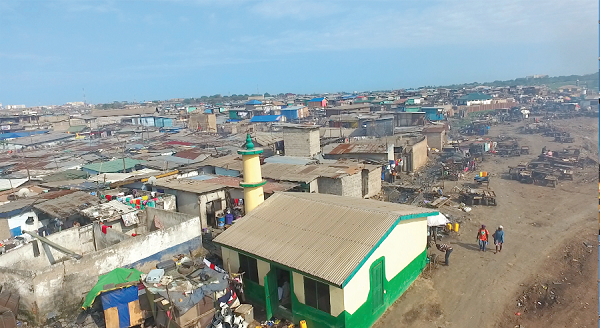
265 slums identified in Accra
About 265 slums at different stages of development have been identified in Accra, a senior lecturer at the Kwame Nkrumah University of Science and Technology (KNUST), Dr Prince K. Anokye, has disclosed.
Citing a recent research conducted by People’s Dialogue on Human Settlements (PD) Ghana, a non-governmental organisation (NGO), he said: “As many as about 116 are still in their infantile stages, with some already fully developed slums.”
Dr Anokye was presenting findings on a literature review and research methodology used in a study of three informal settlements in Accra yesterday. They are Madina Zongo, Agbogbloshie and Chorkor.
He said the project was intended to improve the socio-economic conditions of informal settlers by strengthening their voices and improving access to justice and basic services.
“If we were to use the rights based approach and people begin to know what rights they have, they can actually begin to hold duty bearers accountable, and that can keep the fire on, as it were,” the lecturer added.
Approach
Advertisement

Some structures in Nima located near an open drain
Addressing a national stakeholders workshop on the theme: “Improving governance, voice and access to justice in Ghana’s informal settlements,” Dr Anokye said about 76 informal settlements in Accra had already developed into mature slums, which called for a two-pronged approach: preventive and curative approaches.
He attributed the fast development of informal settlements in Accra and other big cities to the inability of people to find affordable housing when they moved down in search of jobs, and the high cost of land that prevented people from owning their own houses.
Dr Anokye added: “When people migrate, they migrate for economic reasons. They come to eke out a living and they want to live as close to the source of employment as possible. Anywhere far away would mean spending all their money on transportation. That would mean that you will keep having slums around the core areas of the city centres because that is where the jobs are,” he said.
The study was supported by the Land Resource Management Centre (LRMC), People’s Dialogue on Human Settlements, KNUST and the International Development Centre of Canada.
Halting slum development

Structures springing up in some parts of ‘Sodom and Gomorrah in Accra
To reduce this trend, Dr Anokye suggested that the government “must stimulate the market to supply housing that is affordable or ensure that we get a system where people can get access to build their own houses”.
He noted that even though there had been several drawings on housing policies in the country, they had not been implemented.
The lecturer also called for a revision of the country’s housing strategies, where those who could easily afford would be targeted and supported to own houses.
Zongo Development Fund
In a speech read on his behalf, the Minister of Inner City and Zongo Development, Alhaji Boniface Abubakar Sadique, said the Zongo Development Fund would “this year and in the years to come be the catalyst for the transformation the government envisages for Zongos and inner city communities.”
He noted that the ministry had developed a plan for a prosperous, inclusive and sustainably developed inner cities and Zongos on four thematic areas: infrastructure and sanitation, social and economic development, crime and security control and heritage and cultural promotion.
He added that that would be achieved through collaboration with various stakeholders to ensure that the envisaged goals of transformation were reached.
Writer’s email: [email protected]